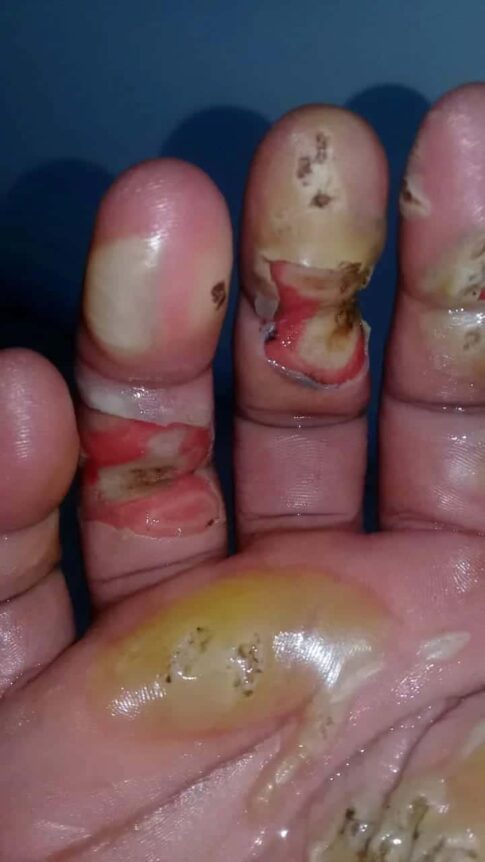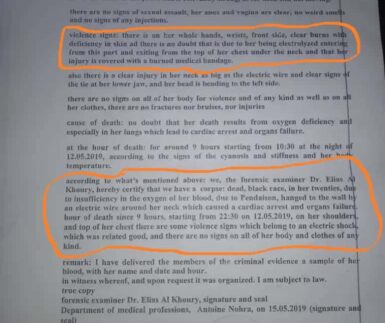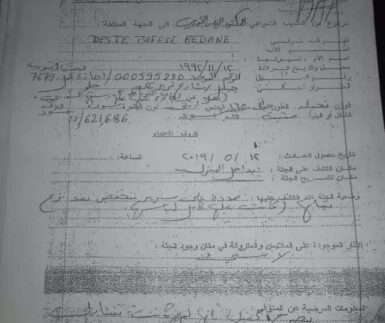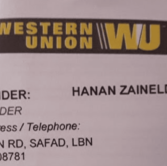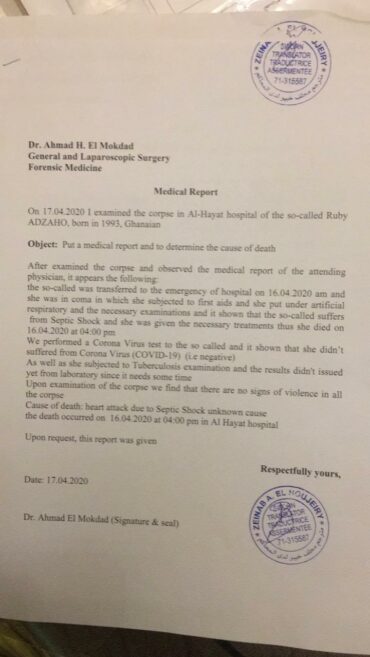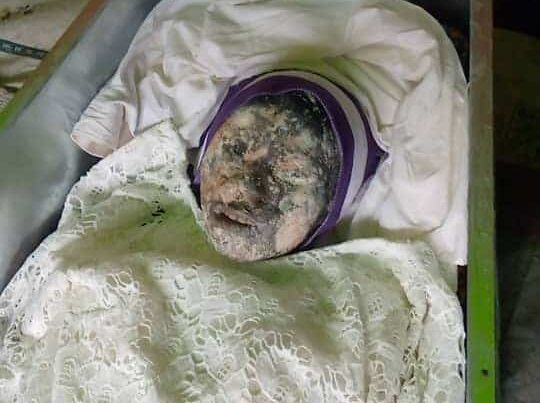THE STORY
TA contacted us on 4 November, 2019: Good evening please I need your help. Please I beg you in the name of God help me out of this place. My problem is am working at Lebanon am do house help. My mister sleep with me beat me if his wife go work. They treat me bad. Please I need your help.
TIL: What do you mean he slept with you? Did he rape you?
TA: Yes he rape me please help me out of the place
TIL: When was the last time you were raped?
TA: Two weeks ago now. Am tired of this place. I told them dat am going back to my country they not allow me
TIL: How many times has he raped you?
TA: 4 times now. I told my Nigeria agent he told them at office they don’t answer me
TA was near Bar Elias, not far from the Syrian border. The last we heard from her she had escaped. Communication with her was difficult because of her limited English. We put her in touch with another Yoruba speaker but have now lost contact with both of them. We believe enough time has passed that it is safe to post her story and warn others about this rapist. Someone must recognize him from the pic she sent us. Contact us if you know his name. We will add it to the article.
TAKE ACTION
We can’t do this alone. We need your help! Join us in this fight.
Contact the Sponsors
Talk to the rapist and ask him to take responsibility for his cruel actions.
Share the Story
Tell others about this. Join us in the fight to ensure that the rapist is brought to justice.
Join Our Work
We need your help to continue our efforts in fighting for TA and others like her.
Get the Updates
Get the updates straight into your inbox so you don’t miss any part of the story.
القصة
اتصلت بنا “ت. أ” في 4 تشرين الثاني 2019: مساء الخير. أرجو مساعدتكم. أرجوكم، أتوسل إليكم بحق الله أن تساعدوني في مغادرة هذا المكان. مشكلتي هي أنني أعمل في لبنان مساعدة في الأعمال المنزلية. سيدي ينام معي ويضربني عندما تذهب زوجته إلى العمل. إنهم يسيئون معاملتي. أرجوكم أنا بحاجة لمساعدتكم.
“هذا لبنان”: ماذا تقصدين أنه نام معك؟ هل اغتصبك؟
“ت. أ”: نعم لقد اغتصبني. الرجاء مساعدتي في مغادرة هذا المكان.
“هذا لبنان”: متى كانت آخر مرة تعرضت فيها للاغتصاب؟
“ت. أ”: منذ أسبوعين. تعبت من هذا المكان. أخبرتهم أني سأعود إلى بلدي لكنهم لا يسمحون لي بذلك.
“هذا لبنان”: كم مرة اغتصبك؟
“ت. أ”: 4 مرات حتى الآن. أخبرت وكيلي في نيجيريا الذي قال لهم ذلك في المكتب، غير أنهم لم يجيبوه.
كانت “ت. أ” بالقرب من بر الياس، ليست بعيدة عن الحدود السورية. وآخر ما سمعناه عنها هو أنها قد هربت. كان يصعب التواصل معها بسبب لغتها الإنجليزية المحدودة. قمنا بوصلها مع شخص يتكلم اللغة اليوربية إلا أننا فقدنا الاتصال بكليهما. نعتقد أنه مضى وقت كافٍ ليكون من الآمن نشر قصتها وتحذير الآخرين من هذا المغتصب.
THE VIDEO
Shekainah Thanks This Is Lebanon
THE STORY
Shekainah went to Lebanon on the understanding that she would work as a ‘house help’. She was surprised to find that her duties included not only cleaning the house but also being nanny to a 14 month-old toddler. She wrote, “In my country the job description u sign for is exactly what u are going to do e.g you sign for nanny, house help or cook – any that you sign for that’s what you are going to be doing.” Not so in Lebanon.
Shekainah said she was overworked,
“Honestly too much over work as if the person working is not a human being like them or is it because of skin colour difference? They should know we are not machines.. that we are human beings like them with flesh and blood.”
Overwork was to become the least of her problems. In July, there was a problem with payment. When she insisted on being paid the $1200 she was owed, her employer began to abuse her physically. She wrote, “He started beating, kicking, punching and pushing me out of their house. Then I started screaming and some people came to my aid.” Her agent came and picked her up.
This Is Lebanon contacted her employers who were reluctant to pay. However, they were planning to move to Canada for the birth of their child and realized that non-payment could jeopardize their plans. The Canadian authorities would take a dim view of forced labour. Consequently, Shekainah received her full salary and is now with a new employer who is paying her regularly.
She expressed her gratitude:
“Thanks so much This is Lebanon. For all Your efforts, I heart ️
️ Youuuu “
TAKE ACTION
We can’t do this alone. We need your help! Join us in this fight.
Share the Story
Tell others about this. Join us in the fight to ensure that this does not happen to anyone else.
Join Our Work
We need your help to continue our efforts in fighting for Shekainah and others like her.
Get the Updates
Get the updates straight into your inbox so you don’t miss any part of the story.
القصة
ذهبت شيكاينه إلى لبنان على أساس أنها ستعمل “مساعدة منزلية”. لكنها فوجئت حين عرفت أن واجباتها لا تشتمل فقط على تنظيف المنزل بل رعاية طفل يبلغ من العمر 14 شهراً أيضاً. كتبت لنا: “في بلدي، وصف الوظيفة الذي توقع عليه هو بالضبط ما ستقوم به، على سبيل المثال، تقوم بالتوقيع على مربية أو مساعدة منزلية أو طاهية – أي شيء تقوم بالتوقيع عليه هو ما ستفعله”. ليس الأمر هكذا في لبنان.
قالت شيكاينه إنها كانت تعمل فوق طاقتها:
“بصراحة هناك الكثير من ضغط العمل وكأن العاملة ليست بشراً مثلهم أم هل هو بسبب اختلاف لون البشرة؟ يجب أن يعرفوا أننا لسنا آلات.. إننا بشر مثلهم من لحم ودم.”
كان الإفراط في العمل هو أصغر مشاكل شيكاينه. وفي تموز، كانت هناك مشكلة في الدفع. عندما أصرت شيكاينه على أن تتقاضى مستحقاتها المالية البالغة 1200 دولار، “بدأ يضربني ويركلني ويلكمني ودفعني بالقوة للخروج من منزلهم. ثم بدأت بالصراخ فجاء بعض الناس لمساعدتي.” جاء وكيلها وأخذها.
اتصلت جمعية “هذا لبنان” بأصحاب العمل الذين كانوا مترددين في الدفع. لحسن الحظ، كانوا يخططون للانتقال إلى كندا من أجل ولادة طفلهم وأدركوا أن عدم الدفع قد يعرض مخططهم للخطر. تنظر السلطات الكندية نظرة قاتمة إلى العمل القسري. حصلت شيكاينه على راتبها كاملاً، وهي الآن مع صاحب عمل جديد يدفع لها بانتظام.
“شكراً جزيلاً هذا لبنان. على كل جهودكم، أحبكم من صميم قلبي.”
THE VIDEO
Watch Kifayat Folashade choke on clorox
THE STORY
Kifayat’s agents, Layla and Ahmad Fawwaz and Layla’s brother Mahmoud, are members in good standing of SORAL, the Syndicate of Recruitment Agencies in Lebanon. Like all agents in the Kafala system, they have tremendous power over the fate of migrant women, whom they are authorized by the government to recruit, effectively hold in custody, organize contracts with, and assign to employers. In theory, agents should look after the best interests of the domestic workers in their care and defend them against abusive employers. Kifayat’s treatment at the hands of her agents, the Fawwazes, demonstrates how distant the reality is from the theory.
A single mother, Kifayat left her two children with her mother in Nigeria in August, 2019 so that she could support them by working as a nanny in Lebanon. At least that is what the Nigerian agent on Facebook told her. It was a lie, according to Mahmoud, and Kifayat resigned herself to the thought of two years of work as a cleaner. Mahmoud claimed he did not have a potential employer, but he could put her to work cleaning his home on a temporary basis. Kifayat worked there for 17 days, and then was placed with Layla Fawwaz and her husband Ahmad, Mahmoud’s sister and brother-in-law, where she worked for two months. Neither Mahmoud nor Layla paid her for her services.
Kifayat was then placed with a couple who paid her but the husband began to pressure her for sexual favours. After four months, she went back to the agency. The Fawwazes were furious with her for leaving her employer, although she told them why she had quit. On February 15, 2020,
Kifayat alleges that Layla and Mahmoud confiscated her money and phone, took her to Batroun, and locked her there for two weeks without any food or drinking water, She claims they beat her daily.
When she asked why they were treating her this way, the Fawwazes replied, “You are not serious.”
Kifayat worked for another employer for a month, but the employer did not pay her, so she returned to the agency. Due to the financial crisis and Covid-19, the Nigerian embassy was, for a brief period, offering to send its workers home, and Kifayat was able to get on the list for a July 17 flight. She says that when she told Mahmoud she wanted to go home he threatened to kill her. She reports being taken outside to a wooded area, tied first by the hands and then around her body to a tree, and beaten severely by Fawwaz family members. She missed her flight. Finally, Kifayat claims:
Mahmoud, who is a government-licensed agent, forced her at gunpoint to drink Clorox.
She managed to make a video of herself suffering the aftereffects of ingesting bleach and send it to someone nearby before Mahmoud again confiscated her phone. The recipient sent the video to TIL, believing that Kifayat had attempted suicide because of her despair at the ill-treatment of her agents, who are members in good standing of SORAL. TIL phoned Mahmoud immediately.
Mahmoud was making manaqeesh when he answered the call. Informed that Kifayat had ingested a caustic cleaning agent, Mahmoud, who is an agent in good standing with SORAL, initially pooh-poohed the report. Urged to check, he said he would after he had finished making the manaqeesh. He phoned back later to say there was no problem, and that Kifayat was a liar who had made a similar video 16 days before. Reminded that he was legally responsible for Kifayat and that TIL had informed the Nigerian embassy Kifayat had taken bleach, he became indignant: “I don’t give a sh** don’t talk to me like this way”. Mahmoud claimed that he would never hold a person against her will and would certainly take her to the embassy the following day. When we were finally able to speak directly with Kifayat she was weeping. She asked for medical help, which she claims she never received. We reassured her she was going home.
Two days later, Mahmoud, who is licensed by the government and an agent in good standing with SORAL, left Kifayat in front of the Nigerian embassy with nothing but her passport and the clothes she was wearing. By then, the Oyo state was no longer helping its domestic workers go home. Kifayat lived for a month on the streets of Beirut with no job, no money, no protection or legal status. She survived because TIL and the Nigerian embassy gave her food from time to time. Eventually the embassy arranged for Kifayat to fly home from the land of nightmares. Without her salary, Kifayat has not been able to begin the small business she had dreamed of creating, and she and her children are living in dire poverty.
Three other domestic workers have complained to This Is Lebanon about being constantly moved from house to house by the Fawwazes agency and being dumped in front of the embassy without their salaries or possessions. Kifayat is not their only victim. Layla Fawwaz and her brother Mahmoud remain members of SORAL, with Lebanese government authorization to control the destinies of migrant domestic workers.
The People
Kifayat Claims: Mahmoud, who is a government-licensed agent, forced her at gunpoint to drink Clorox.
TAKE ACTION
We can’t do this alone. We need your help! Join us in this fight.
Contact the Sponsors
Talk to the Fawwaz Agents and ask them to take responsibility for their actions.
Share the Story
Tell others about this. Join us in the fight to ensure that the Fawwaz agents are brought to justice.
Join Our Work
We need your help to continue our efforts in fighting for kifayat Folashade and others like her.
Get the Updates
Get the updates straight into your inbox so you don’t miss any part of the story.
القصة
ليلى فواز وشقيقها محمود فواز، الوكيلان للعاملة كفايات، هما عضوان يتمتعان بمكانة جيدة في نقابة وكالات التوظيف في لبنان SORAL . ومثل سائر الوكلاء في نظام الكفالة، فإنلهما سلطة هائلة على مصير النساء المهاجرات، اللواتي أذنت لهما الحكومة بتوظيفهن، واحتجازهن فعلياً، وتنظيم العقود مع أصحاب العمل وتعيينهن. من الناحية النظرية، ينبغي على الوكلاء الاهتمام بالمصالح الفضلى لعاملات المنازل فيما يخص رعايتهن والدفاع عنهن ضد أصحاب العمل المعتدين. إن معاملة كفايات التي تلقتها من وكيليها، عائلة فواز، توضح مدى بعد الواقع عن النظرية.
كفايات هي أم وحيدة تركت طفليها مع والدتها في نيجيريا في آب 2019 لكي تتمكن من إعالتهما بأن تعمل مربية أطفال في لبنان. على الأقل هذا ما قاله لها الوكيل النيجيري على الفيسبوك. كان ذلك كذبة، بحسب محمود فواز، فأذعنت كفايات لفكرة عامين من العمل في التنظيف. لقد ادعى محمود أنه ليس لديه صاحب عمل محتمل، لكن بإمكانه أن يجعلها تعمل في تنظيف منزله بشكل مؤقت. فعملت كفايات هناك لمدة 17 يوماً، ثم أرسلها إلى منزل ليلى فواز وزوجها أحمد، أخت محمود وزوج أخته، حيث عملت لمدة شهرين. ولم يدفع لها محمود أو ليلى مقابل خدماتها.
ثم تعيّنت كفايات لدى صاحب عمل لزوجين دفعا لها أجورها لكنهما بدأا في الضغط عليها من أجل ممارسة الجنس. فعادت إلى المكتب بعد أربعة أشهر. وثار غضب عائلة فواز عليها لأنها تركت صاحب عملها، رغم أنها أخبرتهما عن سبب مغادرتها. في 15 شباط 2020، قامت ليلى ومحمود بمصادرة أموالها وهاتفها، على حد قولها. وأخذاها إلى البترون، وحبساها هناك لمدة أسبوعين دون أي طعام أو ماء للشرب، و كانوا يضربونها يومياً، حسب قولها. وعندما سألت عن سبب معاملتهم لها بهذه الطريقة، قالا لها: “لست جادة”.
عملت كفايات لدى صاحب عمل آخر مدة شهر، غير أنه لم يدفع لها أجرها، لذا عادت إلى المكتب. وبسبب الأزمة المالية وكوفيد 19، عرضت السفارة النيجيرية، لفترة وجيزة، إرسال عمالها إلى الوطن، وتمكنت كفايات من الانضمام إلى القائمة لرحلة 17 يوليو. تقول بأنه عندما أخبرت محمود أنها تريد العودة إلى بلدها هدّد بقتلها. وأفادت بأنها اقتيدت إلى منطقة حراجية، وقُيِّدَت يداها أولاً ثم رُبِطَ جسدها إلى شجرة، وتعرضت للضرب المبرح على أيدي أفراد عائلة فواز. ولم تلحق برحلتها. أخيراً:
قام محمود، وهو وكيل مرخّص له من الحكومة، بإجبارها تحت تهديد السلاح على شرب كلوروكس، كما تقول كفايات.
فتمكنت من تصوير فيديو لها وهي تعاني من آثار تناول المادة المبيّضة وإرسالها إلى شخص في الجوار قبل أن يصادر محمود هاتفها مرة أخرى. أرسل المتلقي الفيديو إلى “هذا لبنان”، معتقدة أن كفايات حاولت الانتحار بسبب يأسها من سوء معاملة وكيلَيها، اللذين هما عضوان مرموقان في SORAL. فاتصلت جمعية “هذا لبنان” بمحمود على الفور.
كان محمود يحضّر المناقيش عندما أجاب على المكالمة. وبعد إبلاغه أن كفايات قد تناولت مادة تنظيف كاوية، استخفّ محمود بالخبر في البداية، وهو وكيل يتمتع بسمعة جيدة مع SORAL . وبالإلحاح عليه ليقوم بالتحقق، قال بأنه سيفعل ذلك بعد أن ينتهي من إعداد المناقيش. اتصل لاحقاً ليقول بأنه لا توجد مشكلة، وأن كفايات كاذبة، فقد قامت بتصوير فيديو مشابه قبل 16 يوماً. ولدى تذكيره بأنه مسؤول قانونياً عن كفايات وأن “هذا لبنان” أبلغ السفارة النيجيرية أن كفايات قد تناولت مادة منظفة للتبييض، غضب: “أنا لا أعطي شيئاً **، لا تتحدثوا معي بهذه الطريقة”. وادّعى محمود أنه لن يقوم باحتجاز إنسانة أبداً ضد إرادتها وسيصطحبها بالتأكيد إلى السفارة في اليوم التالي. وحين استطعنا أخيراً من التحدث مباشرة مع كفايات كانت تبكي. طلبت المساعدة الطبية، التي لم تتلقاها أبداً، حسب قولها. طمأنّاها بأنها عائدة إلى وطنها.
بعد يومين، قام محمود، الحاصل على ترخيص من الحكومة ووكيل حسن السمعة في SORAL، بإلقاء كفايات أمام السفارة النيجيرية ولم يكن بحوزتها إلا جواز سفرها والملابس التي كانت ترتديها. حينذاك، لم تعد ولاية أويو تساعد عاملات المنازل في العودة إلى ديارهن. فعاشت كفايات لمدة شهر في شوارع بيروت بلا عمل أو مال أو حماية وبدون أن يكون لها وضع قانوني. لقد بقيت على قيد الحياة لأن “هذا لبنان” والسفارة النيجيرية كانا يقدمان لها الطعام من وقت لآخر. في نهاية المطاف رتبت السفارة لعودة كفايات من أرض الكوابيس إلى بلدها على متن الطائرة. بدون راتبها، ليست قادرة كفايات على بدء المشروع الصغير الذي كانت تحلم بإنشائه، والآن تعيش هي وأطفالها في فقر مدقع.
لقد اشتكت ثلاث عاملات منازل أخريات لـجمعية “هذا لبنان” من نقلهنّ باستمرار من منزل إلى منزل من قبل وكالة “فواز” وإلقائهن أمام السفارة دون رواتبهن أو ممتلكاتهن. وما يزال محمود فواز وليلى فواز عضوين في SORAL ، بتفويض من الحكومة اللبنانية للتحكم في مصير عاملات المنازل المهاجرات.
THE VIDEO
Deborah thanks TIL
THE STORY
Debbie arrived in Lebanon from Nigeria in July 2019. She first contacted This is Lebanon in April 2020, asking for help as it had been months since she was last paid, and she was suffering physical abuse.
“I run away when she start beating me the first time so she pick me up again along the road and take me to the police station and the police say she should give me my money and my passport then take me to the embassy, but she say no..”
This is Lebanon purchased Debbie a ticket home to Nigeria in September, 2020. She was very grateful. She wrote, “Thank you for helping me get home not in pieces but in peace.”
TAKE ACTION
We can’t do this alone. We need your help! Join us in this fight.
Share the Story
Tell others about this. Join us in the fight to ensure that Susan Nasreddine is brought to justice.
Join Our Work
We need your help to continue our efforts in fighting for Deborah and others like her.
Get the Updates
Get the updates straight into your inbox so you don’t miss any part of the story.
القصة
وصلت “ديبي” إلى لبنان قادمة من نيجيريا في تموز 2019. اتصلت لأول مرة بـجمعية “هذا لبنان” في نيسان 2020، تطلب المساعدة لأن آخر مرة قبضت فيها راتبها كانت منذ أشهر، وكانت تعاني من التعنيف الجسدي.
“هربتُ عندما بدأت تضربني للمرة الأولى، فأمسكت بي من جديد على الطريق، وأخذتني إلى مركز الشرطة، وقال الأمن العام أنه يجب عليها أن تعطيني أموالي وجواز سفري ثم تأخذني إلى السفارة، لكنها قالت: لا..”.
اشترى “هذا لبنان” ل “ديبي” تذكرة العودة إلى نيجيريا في أيلول 2020. وكانت في غاية الامتنان. كتبت لنا: “شكراً لكم على مساعدتي في العودة إلى بلدي بسلام وليس قطع أشلاء.”
THE STORY
On 27 February, 2019 Cheryl* arrived in Lebanon to work as a housemaid for Mr. Qassem Bayram and his wife, Rana Eid, who live in Al Wardanieh. At first, everything went really well. Rana welcomed Cheryl warmly and she felt at home. Rana bought Cheryl everything she needed. The salary was to be $250 per month, the standard salary for a Kenyan. Things turned sour at the end of the first month when it was time for Cheryl to receive her salary. Rana paid her only $200. Cheryl says that when she tried to complain and ask why she wasn’t paid the amount in the contract, Rana was furious so she had no choice but to be quiet and accept.
Cheryl says that after the first month, Rana began to change.
“She could shout at me from morning to evening just because of small mistakes. If I forget to do something she could even slap me. If I am playing with the baby and the baby cry a little she shout and even beat me.”
Cheryl said that she began to cry every day. Twice she contacted her Lebanese agent for help but was told that if she wanted to change houses she would have to pay the agent all the money spent bringing her to Lebanon. Cheryl said she “decided to persevere because I really wanted to work.” But her troubles were only just beginning.
Cheryl said that Qassem Bayram began to sexually assault her. She wrote about her time in the house:
“When I was washing the dishes he came at my back and placed his penis on my buttocks and he had just woken up. He was without a t-shirt on the top and with only a boxer. I walked away and told him to stop or I will tell his wife. He started being harsh after that.”
She said that after she refused him he grew a grudge towards her. “One day he sent me to make coffee and at the same time the madam’s mother sent me to make the Argile, so I put water on the gas and ran to bring the Argile before the water boiled.. While I was making the Argile I heard Mr calling me. I went quickly. Then he just started shouting at me. He asked me why I haven’t given him the coffee. When I tried to explain he slapped me very hard. I cried. The mother of my madam came from the other house. I could not say what the Mr had been doing to me because I didn’t have evidence against him. I tried to record some clips on my phone but my phone wasn’t able to play them after the recording..and so I decided to just run away.
“They said I stole diamonds, gold and money but I swear to my living God I came out of that house with the clothes on my body and my Bible.”
After Cheryl ran away she reported to the consulate. This Is Lebanon was able to find her a safe place to stay. She was fortunate to be able to find work with a foreign family who paid her $500 per month until she returned to Kenya in late 2020.
*Her name has been changed to protect her identity.
TAKE ACTION
We can’t do this alone. We need your help! Join us in this fight.
Contact the Sponsors
Talk to the Rana Eid and Qassem Bayram and ask them to pay Cheryl back
Share the Story
Tell others about this. Join us in the fight to ensure that Rana Eid and Qassem Bayram are brought to justice.
Join Our Work
We need your help to continue our efforts in fighting for Cheryl and others like her.
Get the Updates
Get the updates straight into your inbox so you don’t miss any part of the story.
القصة
في 27 شباط 2019، وصلت شيريل * إلى لبنان لتعمل عاملة منزل لدى السيد قاسم بَيرم وزوجته رنا عيد من منطقة الوردانية. في البداية، سار كل شيء على ما يرام بالفعل. فقد رحبت رنا بشيريل بحرارة وشعرت كأنها في بيتها. اشترت رنا لشيريل كل ما تحتاجه. كان الراتب 250 دولاراً في الشهر، وهو الراتب الطبيعي للعاملات الكينيات. لكن الأمور ساءت في نهاية الشهر الأول عندما حان الوقت لشيريل أن تقبض راتبها. دفعت رنا لها 200 دولار فقط. تقول شيريل إنه عندما حاولت أن تشتكي وتسأل عن سبب عدم إعطائها المبلغ المتفق عليه في العقد، ثار غضب رنا، وهكذا لم يكن لديها خيار سوى التزام الصمت والقبول.
تقول شيريل أنه بعد الشهر الأول، بدأت رنا تتغير.
“كان بمقدورها أن تصرخ في وجهي من الصباح إلى المساء لمجرد أخطاء صغيرة. وإذا نسيتُ أن أفعل شيئاً، كان بإمكانها حتى أن تصفعني. إن كنت ألعب مع الطفل وبكى قليلاً، كانت تصرخ وتضربني حتى.”
قالت شيريل أنها راحت تبكي كل يوم. اتصلت مرتين بوكيلها اللبناني للحصول على المساعدة، لكن قيل لها بأنها إذا أرادت تغيير المنزل، فعليها أن تدفع للوكيل كل الأموال التي أنفقها على إحضارها إلى لبنان. قالت شيريل “قررتُ أن أحتمل لأنني بالفعل كنت أرغب بالعمل.” غير أن مشاكلها كانت قد بدأت للتّو.
كان لدى قاسم بيرم غايات تجاه عاملة المنزل الجديدة شيريل وبدأ يتحرش بها جنسياً. عندما ضغطنا عليها للحصول على معلومات، كتبت:
“بينما كنت أغسل الصحون، جاء من ورائي ووضع قضيبه على مؤخرتي وكان قد استيقظ للتو. كان عاري الصدر ويرتدي سرواله الداخلي فقط. ابتعدت عنه وطلبت منه أن يتوقف وإلا سأخبر زوجته. بعد ذلك بدأ يتصرف بقسوة “
قالت إنه بعد أن رفضته أصبح يحمل ضغينة تجاهها. “ذات يوم طلب مني صنع القهوة وفي الوقت نفسه طلبت والدة السيدة أن أعدّ لها النارجيلة، لذلك وضعت الماء على الغاز وركضت لإحضار النارجيلة قبل أن يغلي الماء.. وبينما كنت أحضّر النارجيلة سمعت السيد يناديني. ذهبت بسرعة. فبدأ بالصراخ في وجهي. سألني لماذا لم أحضر له القهوة. عندما حاولت أن أشرح له صفعني بشدة. فبكيت. جاءت والدة سيدتي من المنزل الآخر. لم أستطع أن أقول ما كان السيد يفعله بي لأنه لم يكن لدي دليل ضده. حاولت تسجيل بعض المقاطع على هاتفي لكن هاتفي فشل في تشغيلها بعد التسجيل .. ولذا قررت الهرب.
“قالوا إنني سرقت الماس والذهب والمال ولكني أقسم بالله الحي أنني خرجت من ذلك المنزل بالملابس التي أرتديها والكتاب المقدس الخاص بي.”
تنتهي قصة شيريل هناك، إلا أن القصة لم تكتمل. فقد أبلغ أحد الوكلاء جمعية “هذا لبنان” أن قاسم ورنا استبدلا شيريل بعاملة منزل إثيوبية والتي عادت إلى بلدها في آب 2020 دون أن تقبض أجورها. لكن للأسف، لم نتمكن من الاتصال بها.
* ليس اسمها الحقيقي لحمايتها.
THE STORY
“She loved life and she loved her family,” Tigist Tafesse says while fighting back tears when asked to describe her late sister Desta.
“All she wanted to do was earn enough money to cover her younger brother’s schooling expenses. She didn’t deserve this. Nobody deserves this.”
Tigist’s younger sister Desta, 26, had left her native Ethiopia in search of employment as a domestic worker in Lebanon. It’s a route that many young Ethiopian women take in search of income that could potentially revamp the livelihoods of impoverished families back home. Hundreds of thousands of Ethiopians have flocked to Lebanon over the past decades. And while some do manage to earn a living and send valuable remittances to loved ones in Ethiopia, an increasing number of them are instead entrapped in a cycle of isolation, endless unpaid toiling, food deprivation, horrific abuse and all too often, death.
It was the tragic fate of Desta, who had spent over a year at the home of a Lebanese couple in the city of Byblos, some 30 kilometers north of Beirut.
Her employers were Mr. Helou Hayek and his wife Wafaa Hayek who reside at the Kouba building, near the official high school, Byblos. Mr Hayek’s phone number is +9613621686. Over the course of the last year and a half of her life, Tigist says her sister was never allowed to leave the house and was subjected to ghastly abuse
“They burnt her, beat her and kept her as a slave all this time,” Tigist laments. “I tried everything I could to rescue her.”
Tigist contacted nearby friends in a desperate attempt to hatch an escape plot. She had initially attempted to solicit the aid of a worker’s rights organization in Lebanon, but Desta had begged her not to. She feared that doing so would enrage her captors and result in brutal repercussions for her.
Desta died an untimely death on May 12 2019, after toiling for 14 months without pay. Her death wasn’t considered worthy of a Lebanese police investigation. As is normal in Lebanon, her death was classified as a suicide.
Lebanese police appear unwilling to prosecute anyone suspected of migrant worker abuse, no matter how obvious her mistreatment was.
Prior to her tragic death, Desta, who had limited contact with her family, sent her sister Tigist gruesome images showing horrific burn injuries to her hands on Whatsapp. Heavily bandaged and incapacitated, Desta’s suffering reached its peak in her final days at the Hayek family home, which were also the final days of her life.
Despite being left with injuries that would appear to have rendered it impossible to even grasp objects with her hands, the Lebanese police decided not to question her employers’ claim that she used those same incapacitated hands to make a noose out of an electrical cord and hang herself. The full Lebanese police report, which we’ve obtained here, includes a medical examination by a forensic specialist in Dr. Elias Al Khoury.
Strangely enough, even Dr. Elias is noted as having acknowledged Desta’s burn wounds and bandaged hands, which he states were likely the result of an electrocution. But he still somehow concludes that Desta, bandaged and injured hands, mustered up the strength needed to hang herself.
Desta worked seven days a week and had not been paid for 14 months. Helou and Wafaa Hayak, who are confirmed to have enslaved a young woman confining her to their home for over a year, got off scot free, despite evidence pointing to additional mistreatment and horrific abuse meted out against their employee.
“I didn’t even care about her being paid anymore, I just wanted her out of there alive.”
“I still haven’t come to terms with my sister’s death,” her sister Tigist Tafesse says.
Helou and Wafaa Hayek never paid Desta during the year and a half or so she spent working in their home. With the paltry $150 US monthly rate which Ethiopian domestic workers are hired under, the Hayek family currently owes Desta’s family over $2000 US, which of course doesn’t take into account damages for the confinement and any horrendous abuse suffered.
The People
“They burnt her, beat her and kept her as a slave all this time,” Tigist laments. “I tried everything I could to rescue her.”
TAKE ACTION
We can’t do this alone. We need your help! Join us in this fight.
Contact the Abusers
Talk to the Hayek’s and ask them to admit the truth behind Desta’s untimely death.
Share the Story
Tell others about this. Join us in the fight to ensure that the Hayek’s are brought to justice.
Join Our Work
We need your help to continue our efforts in fighting for Desta and others like her.
Get the Updates
Get the updates straight into your inbox so you don’t miss any part of the story.
القصة
أديس أبابا، 25 تموز 2019 – «كانت تحب الحياة كما أنها أحبت عائلتها أيضاً»، تقول تيغيست تافيس وهي تحبس دموعها حين طُلِب منها أن تصف أختها الراحلة ديستا.
«كل ما أرادت فعله هو أن تكسب ما يكفي من المال لتغطية نفقات تعليم أخيها الأصغر. لم تكن تستحق هذا. لا أحد يستحق هذا»
كانت ديستا، شقيقة تيغيست الصغرى، 26 سنة، قد تركت وطنها إثيوبيا بحثاً عن عمل كمساعدة منزلية في لبنان. وهو طريق تسلكه الكثيرات من الشابات الإثيوبيات سعياً وراء دخلٍ يمكن أن يكون مصدراً جديداً لكسب الرزق لدى العائلات الفقيرة في الوطن. وقد تدفقت مئات الآلاف من الإثيوبيات إلى لبنان على مدى العقود الماضية. وبينما تتمكن بعضهن من كسب لقمة العيش وتحويل مبالغ قيّمة إلى أحبائهن في إثيوبيا، فإن أعداداً متزايدة منهن تقع في شرك دوامة من العزلة والكدح الدائم والحرمان من الطعام والانتهاكات المروّعة وفي كثير من الأحيان الموت.
وكان هذا هو المصير المأساوي للعاملة دستا التي مكثت لأكثر من عام في منزل زوجين لبنانيين في مدينة جبيل، تبعد حوالي 30 كيلومتراً شمال بيروت.
كان صاحب العمل هو السيد حايك حلو، بناء القبة، قرب المدرسة الثانوية الرسمية، جبيل. رقم هاتف السيد حلو هو 9613621686+. تقول تيغيست إنه على مدار العام الماضي، لم يُسمح لشقيقتها بمغادرة المبنى إطلاقاً وأنها تعرضت لانتهاكات مروّعة.
«لقد أحرقوها وضربوها واحتفظوا بها عبدة طوال هذه المدة»، تقول تيغيست بحسرة. «حاولتُ كل ما في وسعي لإنقاذها».
اتصلت تيغيست بأصدقاء في الجوار في محاولة يائسة لتدبير خطة هروب. وحاولت في البداية التماس مساعدة منظمة حقوق العمال في لبنان، لكن ديستا توسلت إليها ألا تفعل ذلك. إذ كانت تخشى أن يثير ذلك غضب آسريها وتكون ردة فعلهما وحشية عليها.
جاءت وفاة ديستا بشكل مفاجئ في 12 أيار، بعد أن شقيت كادحة مدة 14 شهراً دون أجر. لم يكن موتها يستحق تحقيقاً من قبل الشرطة اللبنانية. وكما هي العادة في لبنان، تم تصنيف وفاتها على أنها انتحار.
يبدو أن الشرطة اللبنانية لا ترغب في محاكمة أي شخص يُشتبَه به في إساءة معاملته لعاملة مهاجرة، بغض النظر عن مدى وضوح سوء معاملتها.
وعلى الرغم من تعرضها لإصابات كان يبدو أنه يستحيل عليها حتى إمساك الأشياء بيديها، قررت الشرطة اللبنانية عدم التشكيك في ادعاء صاحب العمل أنها استخدمت تلك الأيدي العاجزة نفسها لصنع حبل مشنقة من سلك كهربائي وشنق نفسها. عملت ديستا سبعة أيام في الأسبوع ولم تحصل على أجرها مدة 14 شهراً. تقول شقيقتها تيغيست تافيس:
«لم أكن حتى مهتمة بأن تتقاضى رواتبها، بل كنت أريد فقط أن تخرج من هناك على قيد الحياة. ولم أزل حتى الآن غير متقبلة لوفاة أختي»
በአማርኛ ለማንበብ
“ቤተሰቦቿን እጅግ በጣም አድርጋ የምትወድ እህቴ ነበረች” ትላለች ወጣት ትግስት ታፈሰ ስለ እህቷ ሲነሳ። የትግስት ታናሽ እህት ደስታ ታፈሰ ስራ ፍለጋ ወደ ሊባኖስ ከተሰደዱ በርካታ ኢትዮጵያውያን እህቶቻችን አንዷ ስትሆን የዛሬ 2 ዓመት ገደማ የ26 ዓመቷ ደስታ በአሰሪዎቿ ቤት እያለች በወቅቱ ባልታወቀ ምክንያት ህይወቷ አጥታለች። “ሰርቼ ተለውጬ ወንድሜንም አስተምሯለሁ ትለን ነበር” ብላ እያነባች አስረድታናለች እህቷ ትግስት። “ወጥቶ መቅረቱ ፈጽሞ አይገባትም ነበር ውዷ እህቴ።”
እንደ ደስታ ታፈሰ በዳኔ ያሉት በመቶ ሺህዎች የሚቆጠሩ ኢትዮጵያውያን እህቶቻችን ኑሮ ለማሸነፍ ወላጅ የመጦር እቅድ ይዘው ከሃገራቸው ተነስተው ወደ መካከለኛው ምስራቅ ተሰድደዋል። በአሁኑ ሰዓት በሀገረ ሊባኖስ ያሉት የኢትዮጵያውያን ቤት ሰራተኞች ቁጥር ከ3 መቶ ሺህ በላይ ነው ተብሎ ይገመታል። በሊባኖስ ያሉት ስደተኞቹ እህቶቻችን መካከል ተቀጥረው ገንዘብ አጠራቅመው ተለውጠው ወደ ሃገራቸው የሚመለሱ ዜጎች አሉ። ሆኖም ግን ሳይቀናቸው በአሰሪዎቻቸው ደሞዝ ተከልክለው የቤት በር ተዘግቶባቸው ተርበው የሰብዓዊ መብት ጥሰት ሰለባ ሆነው የሚንከራተቱ ህይወታቸውንም የሚያጡ ከኢትዮጵያና ከመላው አፍሪካና እሲያ የሚመጡ በርካታ ምስኪን ስደተኞች አሉ።
በሊባኖስ በየ ሳምንቱ በአማካኙ 2 የሰው ቤት ሰራተኞች ህይወት ይቀጠፋል። በሊባኖስ ባለው “ከፈላ” ተብሎ የሚጠራው የህግ አሰራር ሊባኖሳዊ አሰሪዎች ለሰራተኞቻቸው ሞትና ስቃይ በህግ እንዳይጠየቁ ከለላ ይሰጣችዋል።
ወጣቷ ኢትዮጵያዊት ደስታ ታፈሰ በሊባኖስ ዋና ከተማ ቤሩት የ30 ኪሎሜትር ርቀት ላይ የሚገኘው የቢብሎስ ከተማ ስራ ታገኛለች። በቢብሎስ ከተማ ከሁለተኛ ደረጃው ትምህርት ቤት ቅርብ የሆነው የኩባ ህንጻ አከባቢ በሙሉ ስሙ ሄሉ ሃየክ ተብሎ የሚጠራ ሊባኖሳዊ አሰሪና ባለቤቱ ዋፋ ሃየክ ቤት ገብታ መስራት ትጀምራለች። ሄሉ ሃየክ የተባለው አሰሪ ስልክ ቁጥሩ እንደሚከተለው ነው +9613621686።
እንደ ታላቅ እህቷ ትግስት ታፈሰ አገላለጽ ደስታ ስራዋን በጥር 2010 ዓም ጀምራ በአንድ ዓመት ተኩል ቆይታዋ በሳምንት ስባቱን ቀን እየፈጋች ከቤት መውጣቱ እረፍት መውሰዱ ተከልክላ አንዴም እንኳን ደሞዝ ሳትቀበል ኢትዮጵያ ላሉት ቤተሰቦቿ ገንዘብ ለመላክ አላበቃችም። በአንድ ዓመት ተኩል ቆይታዋ በፈረቃ እህቷ ትግስትን በስልክ ይገናኙ እንደነበርና በአሰሪዎቿ ቤት ደስታ እጅግ በጣም ትሰቃይ እንደነበርም ጨምራ አካፍላናለች።
“ደስታን በባርነት እያንከራተቷት ደስ ሲላቸው እየደበደቧት፤ ያቃጥላትም ነበር። ያለውን ስታስረዳኝ እጅግ በጣም እጨነቅና እንቅልፍ ይሰናስኝ ስለነበር እህቴ ከአሰሪዎቿ ቤት የምታመልትበት ሁኔታ ለማመቻቸት ሞከርኩ።”
ትግስት የምታደርገውን ስታጣ በአከባቢው የሚኖሩ ኢትዮጵያውያን ጋር እየደወለች ትብብራቸውን ትለምን ነበር። እህቷ ተስፋ እንዳትቆርጥ እያጽናናቻት በሊባኖስ ወዳሉት የሰበዓዊ መብት ድርጅቶች የመደወል እቅድ እንደነበራትም ለእህቷ ታካፍላለች። ደስታ ይሄንን በሰማች ወቅት እጅግ በጣም ደንግጣ እህቷ ስለሁኔታዋ ለማንም እንዳትተነፍስ ታስጠነቅቃታለች። ገመናቸው ቢጋለጥ ይገሉኛል ብላ ትፈራ እንደነበር ለእህቷ አካፍላለች።
ግንቦት 4 ዕለት 2010 ዓም ደስታ ታፈሰ በዳኔ ከዚህ ዓለም በሞት ተለየችን። ለአንድ ዓመት ተኩል እንደ እስረኛ ተይዛ በዙ ስቃይ አይታ ህይወቷ ቢቀጠፍም የሊባኖስ ፖሊስ ጉዳዩን ላለመመርመር ወስኖ እንኳን ለህግ መቅረብ የካሳ ኢንሹራንስ ክፍያ እንኳን ለቤተሰብ ያደረሰ አካል የለም። የሊባኖስ ፖሊስ የረባ ምርመራ ሳያካሄድ ደስታ እራሷን አጥፍታ መሞቷን መዝግበው አስቀመጡ።
በሊባኖስ ያሉት የሰው ቤት ሰራተኞች ዘግናኝ አሟሟት በመረጃ ቢደገፍም ፖሊስ ለሰው ቤት ሰራተኞች ላላቸው ዝቅተኛ እይታ እና በሃገሪቷ ባለው የከፈላ አሰራር ምክንያት ግልጽ የሆነ ወንጀል ተፈጽሞ ፖሊስ አስክሬን ለኢትዮጵያ ቆንስላ ከማስረከብ ውጪ ሌላ እርምጃ አይወስድም።
ከመሞቷ ጥቂት ቀናት በፊት ደስታ ተቃጥላ በእጆቿ የደረሳት አስከፊ ጉዳትና ጠባሳ ፎቶዎች አንስታ በዋትሳፕ ያለውን ለእህቷ ትግስት ትልካለች። እነዚህ ለማየት የሚዘገንኑ ፎቶዎች ደስታ እጆቿ ተጎድተው ከጥቅም ውጪ ሆነው እንደነበሩ ያሳያሉ። ሆኖም ግን በስሟ የተከፈተው የሊባኖስ ፖሊስ መዝገብ ደስታ አሰሪዎቿ ባልነበሩበት ወቅት በነዚህ በተቃጠሉት እጆቿ ገመድ አስራ እራሷን አንቃ እንደሞተች ይገልጻል። በትንሹ አሳማኝ በሆነ መንገድ ለመዋሸት አለመጣራቸው በፖሊስና በመንግስት ደረጃ ለሰው ቤት ሰራተኞች ያለው ንቀት ጎላ አድርጎ የሚያሳይ ነው።
“እኔ እህቴ ከነነፍሷ ከነዛ አረመኔዎች ቤት ወጥታ ወደ ሃገሯ እንድትመለስ ነበር ፍላጎታችን። የ14 ወር ደሞዟ ጉዳይ በጭራሽ ለደቂቃ እንኳን አላሳሰበንም ነበር። የደስታ ሞት እስካሁን ድረስ መቀበሉ አቅቶኛል።” -ታላቅ እህቷ ትግስት ታፈሰ በዳኔ።

Desta Tafesse
ከማረፏ ጥቂት ቀናት በፊት ደስታ በእጆቿ የደረሳት አስከፊ ጉዳት የሚያሳዩ እነዚህ ሁለት ፎቶዎች ለእህቷ በዋትሳፕ ልካ ነበር። እንደ ሊባኖስ ፖሊስ አቋም እህታችን ደስታ እጆቿ በዚህ ሁኔታ በነበሩበት ነው ገመድ በአንገቷ አሳስራ እራሷን ያነቀችው። ማንን የሸወዱ መስልዋቸው ነው ግን?
THE VIDEO
Watch Stephanie speak out about her experience and thank TIL
THE STORY
This Is Lebanon is constantly investigating conflicting claims between employers and employees. We aren’t always certain of holding the absolute truth and in such cases, choose not to publish an article to avoid slandering an innocent person based on questionable accusations. But at other times the truth is often obvious.
The second scenario applies to the case of Stefani Villanueva, a 22 year old domestic worker from the Philippines, and her employer Fadi Abi Khalil, designer and owner of Abi Khalil Furniture, as well as his wife, Mireille.
Stefani’s mother contacted us in January 2020 concerned because she had not received any call from her daughter in three months. The Abi Khalils confiscated her phone on arrival and communication was intermittent if not absent. They also refused to pay her salary for several months.
According to Stefani, her living conditions were far from exemplary. She had no phone or WiFi access, was only allowed one 15 minute call per month, did not get any day off, was required to do gardening in addition to the general cleaning stipulated by her contract, and her employer insisted on making her stay an additional year beyond her two-year contract. Some of these assertions cannot be proven, but Stefani provided us with the exact dates of her arrival in Lebanon and of the start of her work with the Abi Khalils, as well as the receipts demonstrating Fadi owes her even more than what she claims he does.
As a response, we proceeded to call Fadi. At first, Fadi told us Stefani didn’t have time for a day off, then claimed she had no friends and didn’t want to go out. By repeatedly correcting himself, Fadi only made his credibility weaker.
Regarding payment, Fadi asserts to have agreed on a salary of $250 per month. When we questioned that amount, saying that we had never heard of a Filipino domestic worker being paid so little, he bluffed:
“In Lebanon this is how it’s done”
We requested a copy of the contract which we never received. According to him, he paid her with no receipt.
Not only did Fadi deny Stefani’s claims but he also accused her of theft. He alleged Stefani stole a large sum of money, a used phone, a diamond-cut gold bracelet, as well as other things. According
to his version of the story, he called the police but couldn’t tell which station. Fadi kept Stefani rather than sending her back to the agency and getting another domestic worker because he had found some of the missing items among Stefani’s belongings, he claims, and was hoping to find the rest. When asked where Stefani might have hidden the alleged stolen items, Fadi came up with several hypotheses being all easy to check and barely credible.
We found it hard to believe that an employer would keep a domestic worker who stole under his roof, extend her contract by a year, and continue partially paying her salary.
In the end, under pressure from TIL, Fadi gave up and paid a part of the 5000$ he owed to Stefani before sending her home. However, he short-changed her by $900 after getting her to sign under duress a statement proving she’d been fully paid.
Once in the Philippines, Stefani affirms that Fadi had paid her irregularly and that she never received the $350 mentioned in the contract. Fadi told her after she had begun working that he could not
afford this amount of money. She accepted reluctantly and verbally his proposal to pay $300 a month instead.
Although legally entitled to the former agreed sum, and although she once felt that she could not refuse a reduced salary, Stefani’s calculations were based on $300 per month.
If anyone is considering buying a piece of furniture from Abi Khalil Furniture, we recommend they first listen to Fadi explaining how he dealt with Stefani. Would you buy from someone who lacks integrity?
The voice recording of the WhatsApp conversation between Patricia and Fadi
THE PEOPLE
“In Lebanon this is how it’s done.” – Fadi Abi Khalil
TAKE ACTION
We can’t do this alone. We need your help! Join us in this fight.
Contact the Sponsors
Talk to Fadi and Mireille Abi Khalil and ask them to pay Stefani Villanueva her rightfully earned salary.
Share the Story
Tell others about this. Join us in the fight to ensure that Fadi and Mireille Abi Khalil are brought to justice.
Join Our Work
We need your help to continue our efforts in fighting for Stefani Villanueva and others like her.
Get the Updates
Get the updates straight into your inbox so you don’t miss any part of the story.
القصة
تحقق جمعية “هذا لبنان” باستمرار في الادعاءات المتضاربة بين أصحاب العمل والعاملات. لا نستطيع أن نكون دوماً على يقين من إمتلاك الحقيقة المطلقة، فنختار عدم نشر مقال ما لأننا لا نرغب في تشويه سمعة شخص بريء بناءً على اتهامات مشكوك فيها. لكن غالباً ما تكون الحقيقة واضحة.
ينطبق السيناريو الثاني على حالة ستيفاني فيلانوفا، عاملة منزلية من الفلبين تبلغ من العمر 22 عاماً، وصاحب عملها فادي أبي خليل، مصمم وصاحب “أثاث أبي خليل”، وزوجته ميراي.
اتصلت بنا والدة ستيفاني في كانون الثاني 2020 يساورها القلق على ابنتها لأنها لم تتصل بها منذ 3 أشهر. كانت عائلة أبي خليل قد صادرت هاتفها عند وصولها، و كان الاتصال متقطعاً إن لم يكن معدوماً. كما أنهم رفضوا دفع رواتبها لعدة أشهر.
وفقاً لستيفاني ، كانت ظروفها المعيشية بعيدة كل البعد عن المثالية. لم يكن لديها هاتف أو اتصال بالانترنت، ولم يُسمح لها إلا بمكالمة واحدة لمدة 15 دقيقة شهرياً ، ولم تحصل على أي يوم عطلة ، وكان مطلوباً منها القيام بأعمال البستنة بالإضافة إلى التنظيف العام المنصوص عليه في عقدها، وأصر صاحب العمل على جعلها تقيم سنة إضافية بعد عقدها لمدة عامين. لا يمكن إثبات صحة بعض هذه التأكيدات، لكن ستيفاني زودتنا بالتواريخ الدقيقة لوصولها إلى لبنان وبدء عملها مع أبي خليل ، وكذلك الإيصالات التي تثبت أن فادي مدين لها حتى بأكثر مما تزعم .
رداً على ذلك ، شرعنا في الاتصال بفادي. في البداية، أخبرنا فادي أن ستيفاني لم يكن لديها يوم عطلة ، ثم ادعى أنه ليس لديها أصدقاء ولا تريد الخروج. من خلال تصحيح كلامه مراراً وتكراراً، جعل فادي مصداقيته أضعف.
فيما يتعلق بالدفع، أكد فادي أنه وافق على راتب 250 دولاراً شهرياً. وعندما شكّكنا في أمر هذا المبلغ، قائلين إننا لم نسمع قط عن رواتب فلبينية قليلة إلى هذه الدرجة، تحايل:
«هكذا تتم الأمور في لبنان»
طلبنا منه أن يرسل إلينا نسخة من العقد، و لم نستلمها أبداً. بحسب كلامه لقد دفع لها بدون إيصال.
لم ينكر فادي مزاعم ستيفاني فحسب، بل اتهمها أيضاً بالسرقة. زعم أن ستيفاني قد سرقت مبلغاً كبيراً من المال، وهاتفاً مستعملاً، وسواراً من الذهب مرصعاً بالماس، و أشياء أخرى. بحسب روايته قال أنه اتصل بالشرطة، لكنه لم يستطع تحديد أي مركز شرطة. احتفظ فادي بستيفاني بدلاً من إعادتها إلى المكتب وإحضار عاملة أخرى، على حد زعمه، لأنه وجد بعض الأشياء المفقودة بين أغراض ستيفاني وكان يأمل في العثور على الباقي. عندما سُئل عن المكان الذي قد تخفي فيه ستيفاني الأشياء المزعوم سرقتها، ابتكر فادي عدة نظريات، كان من السهل التحقق منها جميعها ولم يكن أي منها مقنعاً.
وجدنا صعوبة في تصديق أن صاحب عمل ممكن أن يبقي عاملة منزلية تحت سقف بيته وقد سرقت منه ، ثم يمدد عقدها لمدة عام ويستمر في دفع جزء من راتبها.
في النهاية، و بضغط من “هذا لبنان”، استسلم فادي و دفع فادي جزء من مستحقات ستيفاني المالية البالغة 5000$ قبل أن يرسلها إلى وطنها. ومع ذلك، فقد غشها بمقدار 900 دولار، بعد أن أجبرها على توقيع إفادة بأنها حصلت على أجرها بالكامل.
قالت ستيفاني، وقد عادت إلى الفلبين، أن فادي كان يدفع بدون انتظام، وبأنها لم تقبض أبداً مبلغ 350 دولاراً المذكور في العقد. أخبرها فادي بعد أن بدأت العمل أنه لا يستطيع تحمّل دفع 350 دولاراً، فقبلت عرضه على مضض وبشكل شفوي بأن يدفع 300 دولار شهرياً بدلاً من ذلك.
على الرغم من استحقاقها القانوني للمبلغ السابق المتفق عليه، وعلى الرغم من أنها شعرت ذات مرة أنها لا تستطيع رفض راتبها المنخفض، استندت حسابات ستيفاني على 300 دولار شهرياً.
إن أردت يوماً أن يصمم أحد لك قطعة أثاث، فكّر قبل اختيارك “أثاث أبي خليل”. استمع إلى فادي وهو يوضح لنا كيف يعامل ستيفاني ثم خذ بعين الاعتبار فيما إذا سيكون فادي أبي خليل منصفاً معك. يجد “هذا لبنان” أن فادي مصمم جيد، لكن بلا مصداقية على الإطلاق.
THE VIDEO
Hanan was told to continue working without a salary. She then chose to run away…
THE PEOPLE
TAKE ACTION
We can’t do this alone. We need your help! Join us in this fight.
Share the Story
Tell others about this. Join us in the fight to ensure that Hanan is brought to justice.
Join Our Work
We need your help to continue our efforts in fighting for Linda and others like her.
Get the Updates
Get the updates straight into your inbox so you don’t miss any part of the story.
THE VIDEO
If it has a primary video that you want people to watch first, you can put that here.
THE STORY
Adebiyi Kafayat, Nigerian, contacted This Is Lebanon in August 2020 concerned that she hadn’t received any salary since March. She sent us a detailed spreadsheet that her employers, Ibrahim and Nancy Sanyoura of Beirut, kept. Salary deductions were made for hair cuts, wifi usage, etc. Kafayat wrote,
“He’s the most stingy man I have ever seen in my life. The only expenses he and his wife spent on me were less than $50 dollars. He even took back the phone charger.”
The Sanyouras owed Kafayat $800 in unpaid salary. On the day she left Beirut on a free flight paid for by the consulate, the Sanyouras gave her $100 with a promise to send the balance later. Instead, they blocked her. Our attempts to negotiate with the Sanyouras on her behalf also resulted in being blocked.
The People
“He’s the most stingy man I have ever seen in my life. The only expenses he and his wife spent on me were less than $50 dollars. He even took back the phone charger.” – Kafayat
TAKE ACTION
We can’t do this alone. We need your help! Join us in this fight.
Contact the Sponsors
Talk to the Sanyoura Family and ask them to pay Kafayat her rightfully owed salary.
Share the Story
Tell others about this. Join us in the fight to ensure that the Sanyoura Family are brought to justice.
Join Our Work
We need your help to continue our efforts in fighting for Kafayat and others like her.
Get the Updates
Get the updates straight into your inbox so you don’t miss any part of the story.
القصة
اتصلت أديبي كفايات، نيجيرية الأصل، بجمعية “هذا لبنان” في آب 2020، تعرب عن قلقها من أنها لم تقبض أي راتب منذ آذار. أرسلت إلينا جدولاً مفصلاً كان يحتفظ به أصحاب العمل، إبراهيم ونانسي سنيورة من بيروت. تم اقتطاع مبالغ من الراتب مقابل قص الشعر، واستخدام الواي فاي، وما إلى ذلك. كتبت لنا كفايات:
“إنه الرجل الأكثر بخلاً قد رأيته في حياتي. المصاريف الوحيدة التي أنفقها هو وزوجته عليّ كانت أقل من 50 دولار. حتى أنه استرجع مني شاحن الهاتف.”
كانت عائلة سنيورة تدين للعاملة كفايات براتب غير مدفوع تبلغ قيمته 800 دولار. في اليوم الذي غادرت فيه بيروت على متن رحلة مجانية على حساب القنصلية، أعطتها عائلة سنيورة 100 دولار مع وعد بإرسال المبلغ المتبقي لاحقاً. لكن بدلاً من ذلك، قاموا بحظرها. كما أن محاولاتنا للتفاوض مع عائلة سنيورة نيابة عنها كانت نتيجتها الحظر أيضاً.
THE VIDEO
Watch Ruby’s parents speak out
THE STORY
It was every father’s worst nightmare: his daughter’s corpse was returned without explanation. Because his wife Felicia was ill and he was unable to finance further education for his bright daughter Ruby, Daniel Azdaho agreed to the suggestion that 26-year-old Ruby travel from their remote village in Ghana to Lebanon to work for two years to help her family.
A cousin describes Ruby as “the type who is always quiet and does not like trouble”. Ruby arrived in Beirut on the 21st of August, 2019 and found work through a Mr. Bilal at Infinity Services of Gallery Semaan. Five days later Daniel received a call from Ruby, while she was at the agent’s office with the wife of her new employer, Ahmed Ghandour. She told her father:
“Pray for me, the work is very hard. Pray for me.”
A relative recorded the call in which the voices of a female agent and the madam can be heard in the background. Since none of the family understands Arabic, they didn’t realize the agent was saying, “No, you don’t give her your phone number. You watch her work, and if there’s anything you tell me. And put the medicines in a bag. You tell her that you are bringing them to me to the office. I am speaking seriously. It’s forbidden to (indistinct). She shouldn’t know.” Daniel was told that he would not hear from Ruby for three months and so he assumed all was well.
When November had passed and he still had heard nothing and had not received any remittances, Daniel began to worry. A relative who had helped Ruby migrate to Lebanon and who spoke English made enquiries and was told by the agent that despite Ruby having a problem with her leg, apparently an ulceration, the employer was willing to keep her on. She claimed that Ruby was breaking valuable items “every day,” and that the madam made a verbal agreement with Ruby that she would pay for the items broken out of her salary since the madam “isn’t getting money in the street.” The agent said that in this way she believed both Ruby and the employer were getting their rights.
Daniel had a short message from his daughter on the last day of 2019: she had had a leg ulceration that required hospitalization. That day she sent $190 home to help her mother, which enabled Daniel to take his wife Felicia to the hospital for the treatment she needed. This money was, as far as we can find, the only money Ruby ever sent home. We find it hard to imagine a Lebanese employer keeping a worker who, over nine months, was responsible for $1600 worth of breakages.
In January Daniel heard again: she was being molested by her employer and had not had her period for two months. She wanted to work for a different employer or return home to her village in Ghana. She regretted ever coming to Lebanon. Then followed 2½ months of silence.Ruby’s final phone call home came on April 15. It was, again, extremely brief.
In a dull voice she said she was dying.
She complained of pain in her leg, and that her employers were refusing medical treatment, telling her to shut up and demanding, “Don’t you know what you came here to do?” Her last request was that her body be brought back to Ghana. Then the call ended.
In a panic, Daniel rushed to his relative to send a message to the ambassador to take Ruby to a hospital. It was not until two weeks later that Daniel received the dreaded news: his daughter had died the next day, April 16. Daniel felt the embassy was strongly pressuring him to allow her body to be buried in Lebanon because of Covid-related travel difficulties. But Daniel would not relent: if he could not save his girl, he would at least honour her last request. A relative contacted This is Lebanon and we, along with Daniel and Felicia’s community, worked to ensure Ruby was brought home for burial.
But the nightmare was far from over. There followed a long, costly, and difficult journey to the capital to receive and transport the coffin. As is the custom in Ghana, the older women of the village opened the coffin to prepare the body for burial. Daniel and a female relative witness that they found Ruby horribly mutilated: both earlobes were missing, one breast was gone and another mostly removed, one thigh was punctured (possibly the ulceration), the throat was slit, and the head appeared as though acid had been poured over it. It was obvious to them that she had been brutally murdered.
This Is Lebanon received, in both Arabic and English, the statement of the unnamed doctor who admitted Ruby to the hospital, and the hospital death certificate and statement of the forensic doctor regarding cause of death, both signed by Dr. Ahmad El Mokdad. These statements alone, even without the alleged wounds, raise disturbing questions. How does a healthy 26-year-old die of exhaustion doing housework? Anorexia is unknown among black Africans, starvation at the hands of Lebanese employers is not: why assume the former? Why was a dying woman only brought to the hospital when it was too late? (The obvious answer seems that it was the least inconvenient way for the Ghandours to dispose of a corpse.) Should not the forensic doctor have noted emaciation and exhaustion (let alone if there were any amputations, slit throat and other mutilations)? Why did Dr. Ahmad El Mokdad feel the need to deny violence that had not yet been alleged? At the least, this is a case of criminal negligence, manslaughter, theft, and abuse. It could be rape, torture and brutal murder. Aside from the Ghandours, God alone knows the full truth.
The corruption of the Lebanese government and the systemic injustices of the Kafala system make it impossible for Ruby’s parents to get justice for her in this life or compensation for her murder. When we asked Daniel what he wanted from the Ghandours, he asked for Ruby’s belongings, which were not returned with the coffin, and Ruby’s nine months’ wages, her rightful earnings. We also want them to get the death payment required by law from the agent’s insurance company. This is Lebanon has been unable to contact her employer or agent. If you have any information which would help us in securing Ruby’s rights for her family, please message us at https://thisislebanon.info/contact-us.
The People
TAKE ACTION
We can’t do this alone. We need your help! Join us in this fight.
Contact the Abusers
Talk to Ahmad Ghandour and ask him to tell the truth about Ruby’s death!
Share the Story
Tell others about this. Join us in the fight to ensure that Ahmad Ghandour is brought to justice.
Join Our Work
We need your help to continue our efforts in fighting for Ruby’s family and others like them missing their loved ones.
Get the Updates
Get the updates straight into your inbox so you don’t miss any part of the story.
القصة
كان أسوأ كابوس ممكن أن يعيشه أي أب: أعيدت له جثة ابنته دون إيضاح الأسباب. لقد وافق دانيال أزداهو على الاقتراح بأن تسافر روبي البالغة من العمر 26 ربيعاً من قريتهم النائية في غانا إلى لبنان لتعمل مدة عامين كي تساعد الأسرة وذلك بسبب مرض زوجته فيليسيا وعدم تمكنه من التكفل بمواصلة تعليم ابنته اللامعة روبي. يصف أحد أقاربه روبي بأنها «هادئة دائماً ولا تحب المتاعب». وصلت روبي إلى بيروت في 21 آب 2019 ووجدت عملاً عن طريق السيد بلال في “إنفنيتي سيرفس”، غاليري سمعان. وبعد خمسة أيام، تلقّى دانيال مكالمة من روبي، بينما كانت في مكتب الوكيل مع زوجة صاحب عملها الجديد، أحمدي غندور. قالت لوالدها: «صلِّ من أجلي، العمل صعب جداً. صلِّ من أجلي». قام أحد الأقارب بتسجيل المكالمة حيث يمكن سماع أصوات عاملة وسيدة في الخلفية. وبما أنه لا أحد من أفراد العائلة يفهم اللغة العربية، لم يدركوا أن الوكيل كان يقول: «كلا، لا تعطيها رقم هاتفك. أنت راقب عملها، وإذا كان هناك أي شيء أخبرني به. وقم بوضع الأدوية في حقيبة. قل لها بأنك تحضرها لي إلى المكتب. أني جادّ فيما أقوله لك. ممنوع أن..(كلام غير واضح). لا ينبغي لها أن تعرف». لقد قالوا لدانيال بأنه لن يسمع أخبار روبي لمدة ثلاثة أشهر وبذلك افترض أن كل شيء على ما يرام.
عندما انقضى شهر تشرين الثاني ولم يسمع شيئاً أو يتلقّ تحويلات مالية، شعر دانيال بالقلق. قام أحد أقاربها ممن يتكلمون الإنجليزية، وهو الذي ساعد روبي على الهجرة إلى لبنان، بتقديم طلب بالتقصّي فأخبره الوكيل أنه على الرغم من وجود مشكلة في ساق روبي، تقرّح على ما يبدو، إلا أن صاحبة العمل كانت تريد أن تبقيها عندها. وزعمت أن روبي كانت تكسر أشياء ثمينة «كل يوم»، وأن السيدة أبرمت اتفاقاً شفهياً معها وهو أن تدفع ثمن الأشياء المكسورة من راتبها لأن السيدة «لا تحصل على المال من الشارع». قال الوكيل بهذه الطريقة كانت صاحبة العمل تعتقد أن كلتيهما تحصلان على حقوقهما.
تلقى دانيال رسالة قصيرة من ابنته في اليوم الأخير من عام 2019: كانت تعاني من تقرّح في ساقها يتطلب دخول المستشفى. وفي ذلك اليوم، أرسلت 190 دولاراً إلى الأهل لمساعدة والدتها، مما مكّن دانيال من إدخال زوجته فيليسيا إلى المستشفى لتلقّي العلاج اللازم. كان هذا المال، على حد معرفتنا، هو المبلغ الوحيد الذي أرسلته روبي إلى بلدها. من الصعب علينا أن نتخيل صاحبة عمل لبنانية تبقي عندها عاملة، كانت مسؤولة عن كسر أشياء بقيمة 1600 دولار على مدى تسعة أشهر.
في كانون الثاني، سمع دانيال أخبارها مرة أخرى: فقد تعرضَت للتحرش من صاحب عملها وانقطعت عنها دورتها لمدة شهرين. أرادت أن تعمل لدى صاحب عمل آخر أو العودة إلى قريتها في وطنها غانا. لقد شعرت بأشدّ الندم على قدومها إلى لبنان. ثم تبع ذلك شهران ونصف من الصمت.
كانت آخر مكالمة هاتفية لروبي مع أهلها في 15 نيسان. ومرة أخرى، كانت مقتضبة للغاية. قالت بصوت كئيب بأنها تحتضر. اشتكت من ألم في ساقها، وأن أصحاب عملها يرفضون تقديم العلاج الطبي لها، ويأمرونها أن تخرس ويطالبونها قائلين: «ألا تدرين ماذا أتيت إلى هنا لتعملي؟». وكان آخر طلب لها هو إعادة جثمانها إلى غانا. ثم انتهت المكالمة.
هرع دانيال مذعوراً إلى قريبه ليبعث برسالة إلى السفير كي يأخذوا روبي إلى المستشفى. لم يتلقّ دانيال الخبر المروّع إلا بعد أسبوعين: لقد ماتت ابنته في اليوم التالي، 16 نيسان. وشعر دانيال أن السفارة تضغط عليه بشدة للسماح بدفن جثمانها في لبنان بسبب صعوبات السفر المتعلقة ب”كوفيد”. لكن دانيال لم يتراجع: فإن لم يستطع إنقاذ ابنته، سيحترم على الأقل طلبها الأخير. اتصل أحد الأقارب بجمعية “هذا لبنان” فعملنا بالتعاون مع جماعة دانيال وفيليسيا كي نضمن أن يتم إحضار روبي إلى ديارها لتُدفَن هناك.
لكن الكابوس لم ينته بعد. تبع ذلك رحلة طويلة ومكلفة وصعبة إلى العاصمة لاستلام ونقل التابوت. وكما هي العادة في غانا، قامت النساء الأكبر سنّاً في القرية بفتح التابوت لتحضير الجثمان للدفن. يشهد دانيال وإحدى أقاربه أنهما وجدا روبي مشوهة بشكل مروّع: شحمتا الأذنين مفقودتان، أحد الثديين قد اختفى والآخر استؤصل معظمه، وقد ثُقِب أحد الفخذين (ربما بسبب التقرّح)، هناك نحر في الحنجرة، وبدا الرأس كما لو أن أسيداً قد سُكب عليه. كان من الواضح لهم أنها قُتلت بوحشية.
تلقى “هذا لبنان”، باللغتين العربية والإنجليزية، إفادة الطبيب المجهول الاسم الذي أدخل روبي إلى المستشفى، وشهادة وفاة من المستشفى مع بيان الطبيب الشرعي المتعلق بسبب الوفاة، كلتاهما موقّعتان من الدكتور أحمد المُقداد. هذه التصريحات وحدها، حتى بدون الجروح المزعومة، تطرح تساؤلات مثيرة للقلق. كيف تموت شابة معافاة تبلغ من العمر 26 عاماً من الإرهاق أثناء القيام بالأعمال المنزلية؟ إن مرض فقدان الشهية غير معروف بين الأفارقة السود، إنما التضور جوعاً على يد أصحاب العمل اللبنانيين فهو شائع: لماذا نفترض السبب الأول؟ لماذا تم إحضار امرأة تحتضر إلى المستشفى فقط بعد فوات الأوان؟ (يبدو أن الإجابة الواضحة هي أنها كانت الطريقة الأسهل للتخلص من الجثة). ألم يكن للطبيب الشرعي أن يلاحظ الهزال والإرهاق (ناهيك عما إذا كان هناك أي بتر أو نحر في الحلق أو تشوهات أخرى)؟ لماذا شعر الدكتور أحمد المقداد بضرورة إنكار العنف الذي لم يزعمه أحد بعد؟ على الأقل، هذه حالة إهمال إجرامي، و قتل، وسرقة، وتعنيف. يمكن أن يكون اغتصاباً وتعذيباً وقتلاً وحشياً. إن الله وحده يعرف الحقيقة الكاملة باستثناء عائلة غندور.
إن فساد الحكومة اللبنانية وأوجه الظلم الممنهَجة لنظام الكفالة يجعل من المستحيل على والدَي روبي الحصول على العدالة لها في هذه الحياة أو التعويض عن قتلها. عندما سألنا دانيال عما يريده من عائلة غندور، طلب مقتنيات روبي، التي لم يتم إرجاعها مع التابوت، وراتب روبي عن تسعة أشهر، الذي هو مكسبها الشرعي. نريد أيضاً أن يحصل أهلها على تعويض عن الوفاة بموجب القانون من شركة التأمين التابعة للوكيل. لم يتمكن “هذا لبنان” من الاتصال بصاحب عملها أو وكيلها. إن كانت لديكم أية معلومات من شأنها أن تساعدنا في تأمين حقوق روبي من أجل عائلتها، يرجى مراسلتنا على https://thisislebanon.info/contact-us.










